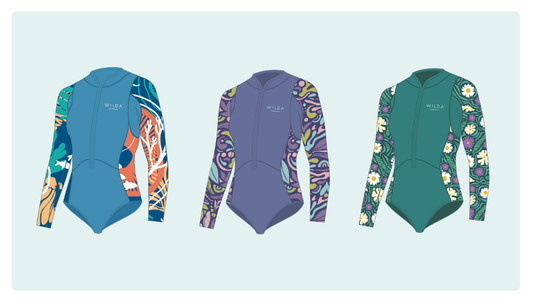Your new wetsuit is built to handle countless swims in challenging conditions, but proper care will ensure it performs at its best for years to come. Follow these simple guidelines to protect your wetsuit and help it to last for as long as possible.
First Try-On: Handle with Care
Take extra caution when trying your wetsuit on for the first time. Nails can leave discolouration marks on the neoprene, so we recommend wearing thin gloves during your initial fitting. If you do notice any marks, don't worry - they're purely cosmetic and won't affect your wetsuit's performance or durability.
After Every Swim
Rinse thoroughly by hand in cool water immediately after each use. This removes salt, chlorine, sand, and other contaminants that can break down the neoprene over time. Even if you've been swimming in fresh water, a good rinse helps remove body oils and other residues.
Drying Your Wetsuit
Always dry your wetsuit flat and out of direct sunlight. Lay it on a clean, flat surface where air can circulate around it. Heat and UV rays can damage the neoprene material so avoid radiators, direct heat sources, and sunny windowsills.
What to Avoid
Never machine wash, tumble dry, or iron your wetsuit. These processes can severely damage the neoprene, compromising the suit's flexibility, warmth, and water-sealing properties. The delicate material requires gentle, manual care.
Storage
Once your wetsuit is completely dry, store it lightly folded in a cool, dry place. Avoid hanging it for extended periods, as this can stretch the shoulders and create permanent creases. A loose fold through the middle works well for most storage spaces.
Wetsuit Lubes and Creams
The cut of the neckline on our wetsuits and the choice of lining material should reduce the amount of chafing - and hopefully mitigate it altogether - however we all have slightly different neck shapes and sometimes a little bit of chafing on a longer swim is unavoidable. If you do need a lubricant then we recommend using Ocean Lube - it performs excellently, is ocean friendly and doesn't contain petroleum so is much kinder to your wetsuit.
Repairs and Maintenance
If your wetsuit becomes damaged - whether from a small tear, loose seam, or other issue - contact Wilda for advice on repairs. Professional repairs can significantly extend your wetsuit's lifespan and maintain its performance. Don't attempt DIY fixes with household adhesives, as these can often make the damage worse.
Long-Term Care
With proper care, your wetsuit will provide reliable performance season after season. The few extra minutes you spend on maintenance after each swim will pay dividends in comfort, warmth, and durability.



